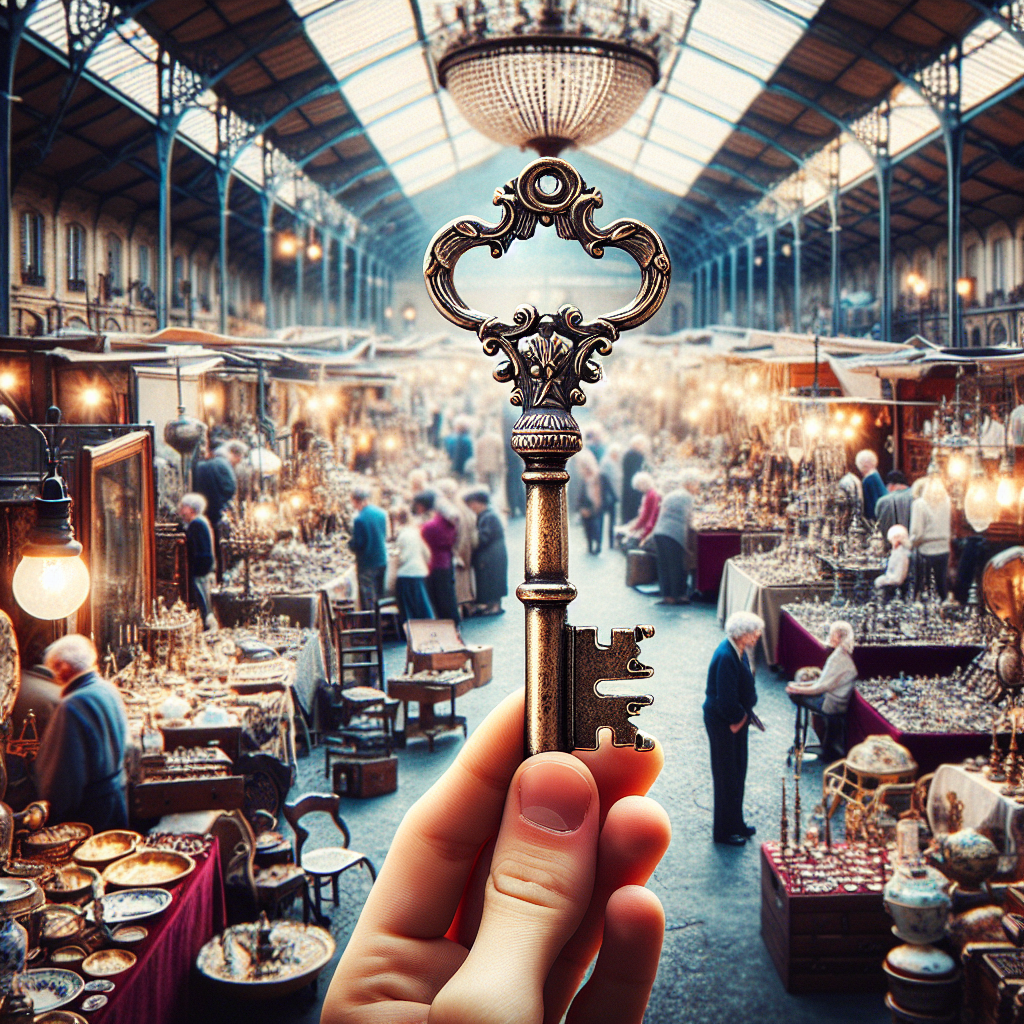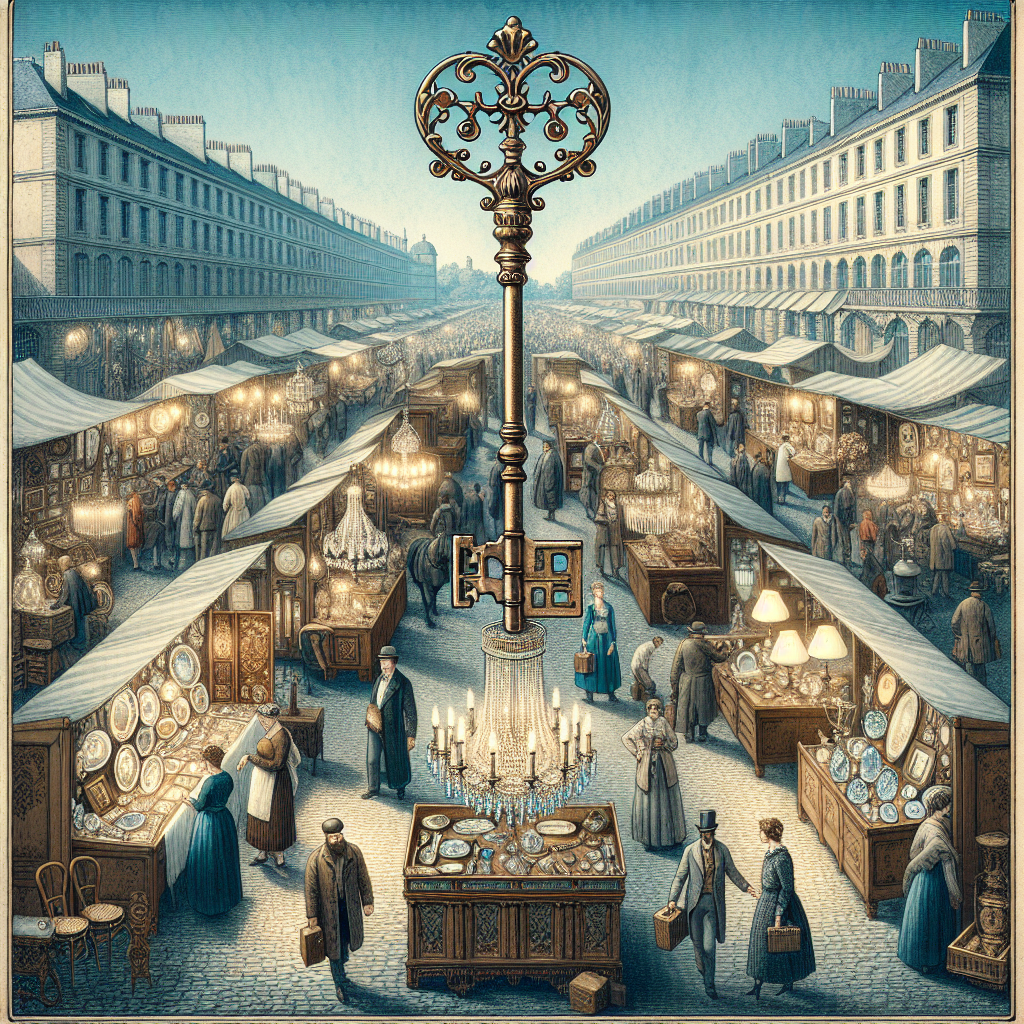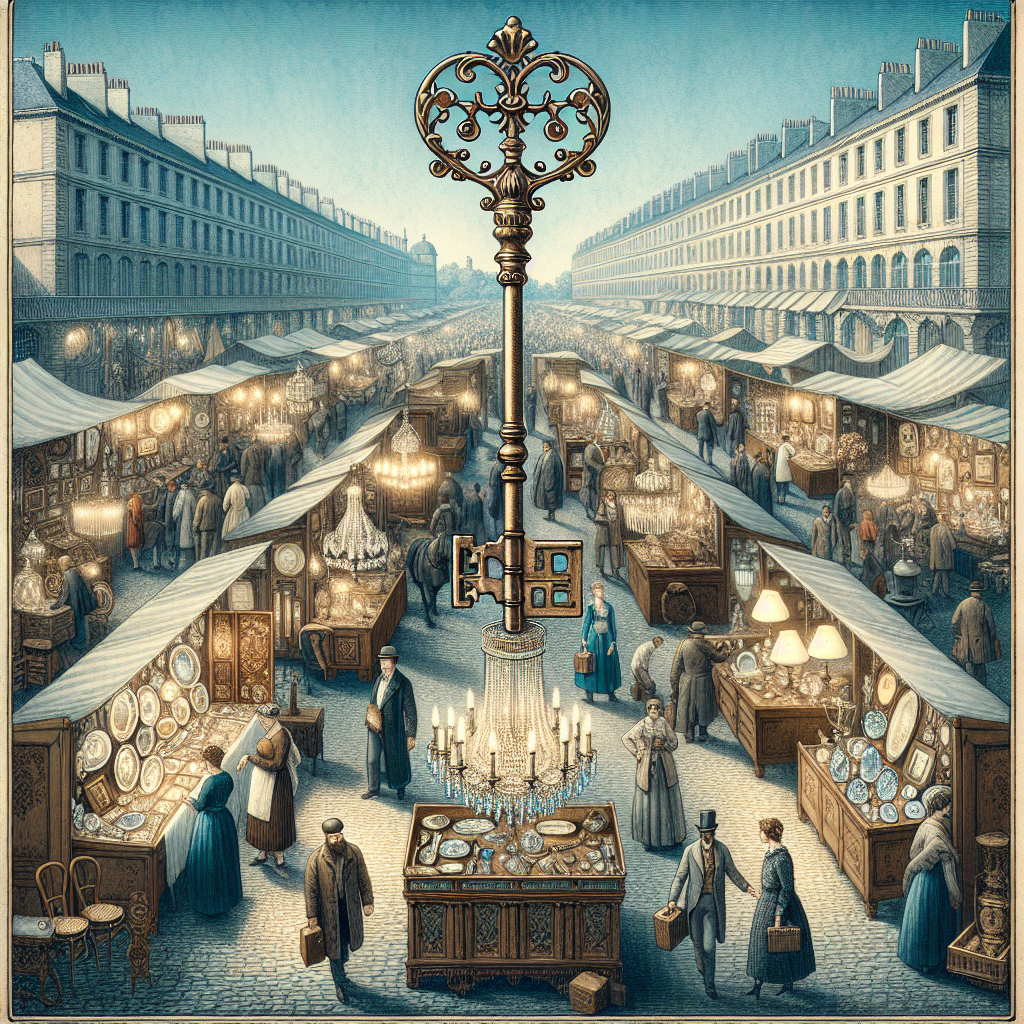Whether you are a seasoned collector or a casual shopper, navigating the French antique markets can be a delightful and rewarding experience. From charming flea markets in hidden alleys to grand antique fairs in bustling squares, these markets offer a treasure trove of unique and exquisite items, each with its own fascinating story. With their rich history and diverse range of offerings, the French antique markets are a paradise for those seeking to add a touch of elegance and nostalgia to their homes. So grab your walking shoes and embark on a journey through time as you explore the enchanting world of French antiques.
Planning Your Trip
Researching the Markets
Before embarking on your journey to the French antique markets, it’s crucial to conduct thorough research. Start by identifying the key cities and regions known for their antique markets, such as Paris, Lyon, and Provence. Take note of their market schedules, as some are held weekly while others are seasonal or annual events. Additionally, explore online resources, guidebooks, and forums to discover the most highly regarded markets and gather insights from experienced collectors.
Determining Your Route
Once you’ve identified the markets you want to visit, it’s essential to plan your route accordingly. Consider the proximity of each market to one another and the logistics of transportation. Think about whether you prefer to explore one region at a time or if you want to cover multiple areas during your trip. Remember to factor in additional attractions or experiences you’d like to include, such as historic landmarks or local cuisine, to make the most of your time in France.
Choosing the Right Time to Go
The timing of your trip to the French antique markets can greatly impact your overall experience. Take into account seasonal variations in market availability and the potential for higher tourist volumes during peak travel periods. Consider attending the markets during less crowded times if you prefer a more personalized experience and greater opportunities for negotiation. Additionally, research the climate and weather patterns to ensure you pack appropriate clothing and plan accordingly for outdoor markets.
Understanding the Markets
Different Types of Markets
The French antique markets offer a wide range of market types, each with its unique characteristics. Brocante markets predominantly feature second-hand goods and vintage collectibles, while flea markets showcase a mix of antiques, vintage items, and general bric-a-brac. Marché aux puces emphasizes more on furniture and bigger items. Salon des Antiquaires, on the other hand, presents high-end antique pieces. Understanding these distinctions can help you tailor your market visits to suit your specific interests and preferences.
Popular Antiques Sold
When exploring the French antique markets, you’ll encounter a plethora of fascinating treasures. From antique furniture, including elegant Louis XVI chairs and ornate Louis Philippe armoires, to vintage textiles like artful tapestries and delicate lace, there is no shortage of collectibles. Exquisite porcelain, vintage glassware, antique jewelry, and unique art pieces are also prevalent. Take the time to immerse yourself in the history and craftsmanship of these items, allowing them to transport you to a different era.
Negotiating and Bargaining
In French antique markets, negotiation and bargaining are common practices. While it may feel unfamiliar or even uncomfortable at first, embracing this aspect of the experience can lead to exciting finds and potentially better prices. Remember to approach negotiations with respect, as building rapport with vendors is essential. Brushing up on your negotiating skills and having a firm but polite demeanor can help you secure fair deals and make the most of your budget.

Preparing for the Experience
Learning Basic French Phrases
Although many vendors in the French antique markets speak English, it is beneficial to learn some basic French phrases to facilitate communication and create a more immersive experience. Simple greetings like “bonjour” (hello) and “merci” (thank you) go a long way in establishing a friendly rapport with vendors. Being able to ask questions about an item’s history or negotiate in French can also enhance your interactions and potentially lead to more insights and favorable deals.
Bringing Essential Tools
Being prepared with a few essential tools can assist you in evaluating the authenticity and quality of the items you encounter. Consider bringing a small flashlight to closely examine intricate details, a magnifying glass for scrutinizing marks or signatures, and a measuring tape to ensure the right fit for furniture or accessories. Additionally, packing a notepad and camera can help you take notes, capture images of items you’re interested in, and compare options as you explore multiple markets.
Arranging Transportation
To make the most of your time in the French antique markets, it’s crucial to arrange transportation that suits your needs. If you’ll be visiting multiple markets in different cities, renting a car can provide the convenience and flexibility to explore at your leisure. However, if you prefer not to drive, France’s reliable public transportation system, including trains and buses, can be an efficient and cost-effective option. Research transport options in advance, considering factors such as luggage space, accessibility, and ease of navigating between markets.
Navigating the Markets
Mapping Out Your Strategy
With numerous markets to explore, strategically planning your itinerary can help you make the most efficient use of your time. Start by identifying the must-visit markets and create a schedule that allows for leisurely exploration and potential unexpected discoveries. It can be helpful to group markets located in proximity to one another on the same day, ensuring minimal travel time. However, also allocate some flexibility in your schedule to indulge in impromptu detours or leisurely breaks at charming cafés nearby.
Identifying Reliable Dealers
While French antique markets boast a vast array of vendors, it’s crucial to identify and engage with reliable dealers. Look for vendors who specialize in the type of items you’re interested in, as their expertise and passion can greatly enhance your shopping experience. Take note of dealers who display a professional and organized setup, maintain accurate item descriptions, and can provide additional information or historical context. Trusting your instincts and seeking recommendations from fellow collectors or locals can also guide you towards reputable vendors.
Exploring Different Sections
To fully immerse yourself in the French antique markets, be sure to explore the various sections available. Some markets have specific areas dedicated to different types of items, such as furniture, textiles, or fine art. By venturing beyond the main thoroughfares, you might discover hidden gems, unique pieces, or vendors that cater to niche interests. The bustling atmosphere and the treasure trove of offerings in every nook and cranny are part of the charm, so explore freely and allow yourself to be pleasantly surprised.

Understanding Authenticity and Value
Spotting Genuine Antiques
Evaluating the authenticity of antiques can be a challenging task, but with some knowledge and observant eyes, you can discern genuine pieces from reproductions or replicas. Look for signs of aging, wear, and patina that are consistent with the item’s purported age. Pay attention to craftsmanship, intricate details, and any unique features that indicate a piece’s authenticity. Familiarize yourself with the hallmarks or maker’s marks used during specific periods to further validate the item’s origin. If uncertain, don’t hesitate to ask the vendor for additional details or seek the opinion of an expert.
Evaluating Condition and Quality
Apart from authenticity, evaluating the condition and quality of an antique is essential to ensure its long-lasting value. Assess the structural integrity and functionality of furniture, examining for any signs of damage or repairs. When it comes to delicate items such as porcelain or glassware, check for any chips, cracks, or restoration work that may affect their value or aesthetic appeal. Remember that signs of aging can actually add charm and character, but severe damage or poor quality may warrant a reconsideration of your purchase.
Considering Provenance
The history and provenance of an antique can greatly enhance its allure and value. Provenance refers to the documented evidence of an item’s origin, previous owners, and historical significance. When assessing an antique’s provenance, consider accompanying certificates, labels, or receipts that provide details about its past. Look for items with a compelling story, a notable previous owner, or a connection to a specific time or place in history. A piece that carries with it a rich narrative can add a layer of intrigue and personal connection to your collection.
Making Informed Purchases
Setting a Budget
Before delving into the French antique markets, it’s prudent to establish a budget for your purchases. Determine the maximum amount you’re willing to spend and allocate a portion to each category or type of antique you’re interested in. This strategy helps prevent impulse buying and allows for a more balanced and focused approach. Be sure to factor in additional expenses like shipping, customs fees, or any restoration work that may be required upon your return home.
Knowing the Market Value
To ensure you obtain a fair deal, take the time to research and familiarize yourself with the market value of the items you’re interested in. Browse online marketplaces, consult reference books or price guides, and seek the expertise of local experts or antique appraisers. Understanding the typical price range for specific items will empower you during negotiations and enable you to confidently assess whether a vendor’s asking price aligns with the current market value.
Asking for Certificates and Receipts
When purchasing antiques from the French markets, it’s important to request certificates of authenticity and receipts whenever possible. These documents serve as proof of your purchase and can be valuable if you plan to resell or include the items in your insurance coverage. Certificates of authenticity provide assurance of the item’s genuine nature, while receipts detail the purchase price and any additional information provided by the vendor. Keep these documents safely stored with your collection for future reference.
Dealing with Shipping and Customs
Researching Shipping Options
Once you’ve made your purchases, it’s essential to navigate the logistics of shipping your treasures back home. Research reputable shipping options that specialize in transporting fragile and valuable items internationally. Look for companies with experience in handling antiques and a track record of safe and timely deliveries. Obtain quotes, compare services, and consider factors such as insurance coverage, packaging requirements, and estimated delivery times to make an informed decision.
Understanding Import Regulations
Before shipping your antiques, familiarize yourself with the import regulations and customs requirements of your home country. Some items may be subject to restrictions, duty fees, or inspection upon arrival. Ensure you understand the necessary documentation and procedures to comply with these regulations, preventing any unforeseen complications or delays. It may be beneficial to consult with customs authorities or consider engaging the services of an experienced customs agent to navigate this process smoothly.
Working with a Reputable Agent
If dealing with shipping and customs seems overwhelming, enlisting the services of a reputable agent can alleviate much of the stress. A professional shipping agent or logistics company experienced in handling international antique transports can guide you through the necessary paperwork, packaging, and customs procedures. They can provide expert advice, ensure compliance with import regulations, and offer peace of mind, knowing your prized antiques are in competent hands.
Preserving and Displaying Your Finds
Cleaning and Restoring Antiques
Once your French antique treasures arrive safely, it’s important to take proper care to preserve their beauty and longevity. Depending on the item’s material and condition, you may need to enlist the help of professional restorers. Allow experts to handle delicate tasks such as repairing furniture, cleaning textiles, or removing tarnish from silver. For day-to-day maintenance, use gentle cleaning techniques and suitable products recommended for specific materials to maintain the item’s original luster and charm.
Choosing the Right Display Method
Your newly acquired antiques deserve to be showcased in a manner that highlights their uniqueness and elegance. Consider the style of your home and the overarching aesthetic you wish to create to guide your display choices. Antique furniture can be incorporated seamlessly into existing décor, while smaller items like porcelain or jewelry can be displayed in glass cabinets or on dedicated shelves. Explore various display methods, such as arranging items in curated vignettes or creating focal points that draw attention to particular pieces.
Protecting and Maintaining
To ensure the long-term preservation of your French antique collection, take steps to protect and maintain each item. Utilize appropriate storage solutions, such as acid-free tissue paper, archival boxes, or protective sleeves, to prevent damage from dust, moisture, or exposure to sunlight. Regularly dust and clean your display area, paying attention to the unique needs of each item. Consider engaging professionals for appraisals or periodic inspections to detect and address any potential issues promptly.
Joining the Antique Community
Attending Local Events and Fairs
To deepen your connection with the antique world and expand your knowledge, attending local events and fairs is highly recommended. Look for antique exhibitions, trade shows, or specialized events that gather collectors, dealers, and experts in one place. These occasions offer opportunities to view rare or unique items, engage in informative discussions or presentations, and connect with like-minded individuals passionate about antiques. Stay updated on event listings and take advantage of these enriching experiences during your time in France.
Connecting with Other Collectors
Building relationships with fellow collectors can be a valuable aspect of your antique journey. Seek out antique clubs or societies in your local area or online communities dedicated to antique collecting. Participate in discussions, share your own experiences and expertise, and ask questions to tap into the wisdom of seasoned collectors. Networking with fellow enthusiasts can offer insights, foster friendships, and potentially lead to future collaborations or opportunities to acquire rare pieces.
Joining Online Antique Groups
In the digital age, online antique groups and forums provide a vibrant space for collectors to interact, share knowledge, and seek advice. Joining these communities can broaden your perspective, expose you to international trends, and provide access to a vast pool of expertise. Share your finds, seek identification or valuation guidance, and engage in lively discussions with members from around the globe. Embrace the digital antique community as a valuable resource and a means to foster connections beyond geographical boundaries.
Immersion in French Culture
Exploring Local Cuisine and Cafés
Beyond the enchantment of the French antique markets, immersing yourself in the local cuisine and café culture allows for a truly holistic experience. Indulge in mouthwatering pastries, savor the aroma of freshly brewed coffee, and savor classic French dishes in charming bistros and eateries. Venture beyond tourist hotspots and seek out local culinary gems to appreciate the flavors and traditions deeply woven into French culture. Every bite and sip will further enrich your journey, creating lasting memories intertwined with your antique treasures.
Visiting Historical Landmarks
France is renowned for its rich history and abundance of historical landmarks. Take advantage of your antique expedition to visit iconic sites and immerse yourself in centuries of captivating stories. Explore exquisite palaces, such as the Palace of Versailles, walk the cobbled streets of medieval towns like Carcassonne, or marvel at Gothic cathedrals like Notre-Dame de Chartres. Each visit will offer glimpses into the past, further deepening your appreciation for the artistry and craftsmanship represented in the French antiques you’re collecting.
Appreciating Art and Architecture
From world-class museums to charming local galleries, France is a haven for art lovers. Devote some time to immerse yourself in the remarkable art and awe-inspiring architecture that surround you. Marvel at masterpieces in the Louvre, appreciate the Impressionist works at Musée d’Orsay, or explore the intriguing contemporary art scene in the Marais district of Paris. The fusion of art, architecture, and antiques is an integral part of French culture, and indulging in this creative landscape will undoubtedly inspire and nourish your passion for collecting antiques.
By following this comprehensive guide to navigating the French antique markets, you’ll be well-prepared to embark on a remarkable journey filled with awe-inspiring discoveries, enriching experiences, and cherished treasures. Immerse yourself in the history, culture, and charm of France as you navigate the markets, make informed purchases, and ultimately create a collection that tells its own unique story. Enjoy every moment of this adventure and let your passion for antiques guide you towards unforgettable memories and timeless treasures.
